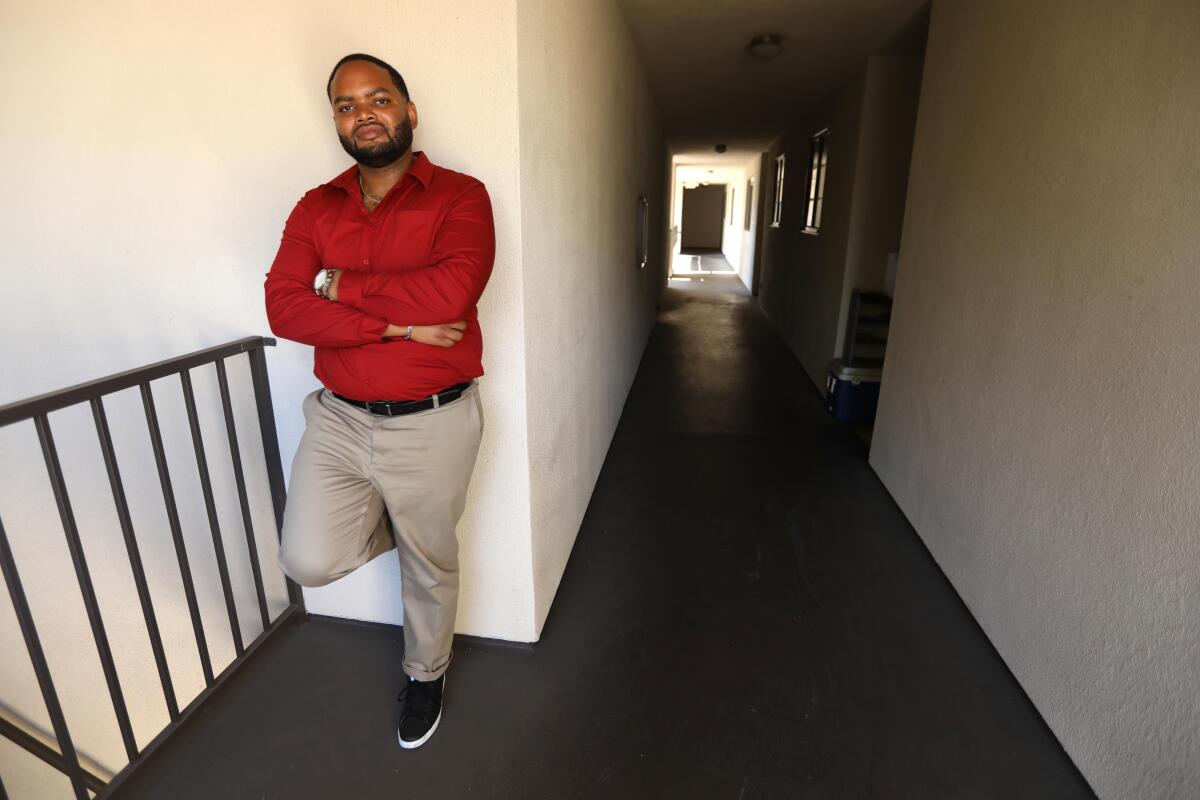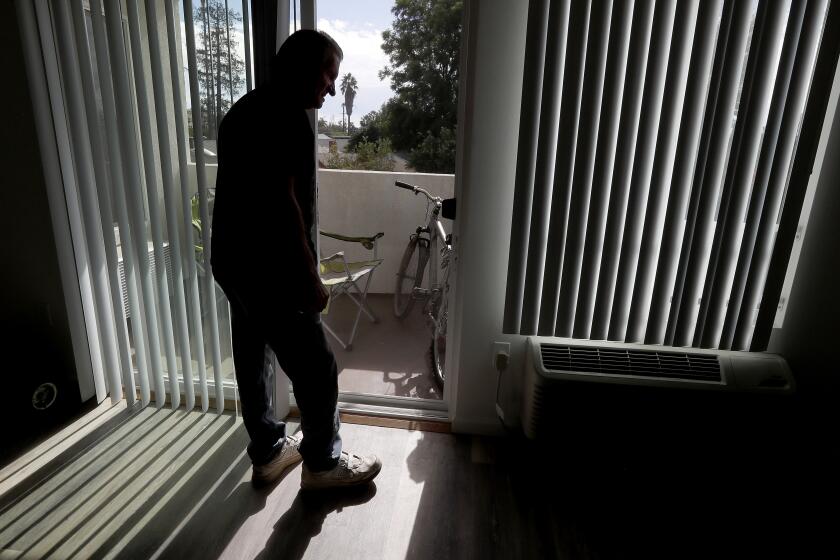California outlawed Section 8 housing discrimination. Why it still persists

- Share via
Robert Gardner said he knew it was time to move after he came home to find his Valley Village apartment broken into and ransacked.
He originally moved there for safety, a change the South L.A. native comfortably afforded on minimum wage because a coveted Section 8 voucher covered most of the rent.
But recently, Gardner noticed more drug dealers outside his apartment. One neighbor’s car was broken into twice; another’s was vandalized.
After his own break-in, he’d wake up in a sweat, fearing another intruder.
He wanted out, but there was a major problem: Leasing agents for other landlords repeatedly told him they didn’t accept Section 8 vouchers.
“I just keep hitting a brick wall,” Gardner, 32, said. “I was like, ‘I am never going to get out of this apartment, and something is going to happen to me.’ ”
More than two years after a law in California made it illegal for landlords to refuse to rent to people who pay through Section 8 and other subsidies, leasing agents routinely reject tenants because of their vouchers or illegally discourage their applications, according to tenant advocates and state officials.
The state’s Civil Rights Department sponsored testing revealing that nearly half of properties polled in L.A. County this year showed signs of “unlawful discrimination” against voucher holders.
Like the state, the Housing Rights Initiative, a national investigative nonprofit, has sent people to pose as renters in L.A. and test whether landlords accept Section 8.
“Los Angeles is a festering hotbed of housing voucher discrimination,” said Aaron Carr, the group’s executive director.
The Section 8 program, named after a section of the federal Housing Act, is one of the U.S. government’s most powerful tools to keep rental housing affordable and to fight overcrowding and homelessness.
Administered by local agencies, the program was launched in the 1970s by the federal government as an alternative to costly public housing projects, which were criticized for segregating poor families in neighborhoods with low-quality schools and other substandard services.
Unlike public housing, the subsidy under Section 8 can move with tenants so that they can find housing with private landlords.
Starting Oct. 17, low-income Los Angeles residents will have two weeks to submit an application online for a chance to be added to a Section 8 housing lottery waiting list.
But while Section 8 pays rent for 2.35 million households nationwide, tenants have long found it difficult to find landlords who’ll accept their vouchers.
Vouchers often are worth less than rents in middle-income neighborhoods, narrowing options at the outset. With rentals that are in the right price range, the paperwork, inspections and delays it can take to rent to Section 8 tenants make some landlords wary.
Other landlords believe voucher holders are bad tenants — which advocates say is inaccurate and can reflect negative stereotypes of poor people, as well as people of color, who make up a majority of Section 8 participants.
In 2020, amid a long-running affordable housing crisis, California joined a handful of other states when a “source-of-income” law took effect, making it illegal to discriminate against tenants who pay with subsidies.
Before the state acted, the city of Los Angeles passed a similar ordinance, which also took effect in 2020.
Under these laws, landlords are not required to lower the rent to make it affordable to voucher holders or to rent to every Section 8 household that applies. But they can no longer refuse to consider a tenant for having a rental subsidy. Once-common rental ads that displayed “No Section 8” are now illegal.
Implementing different rules for tenants with and without vouchers is also illegal. For example, while landlords can require a certain credit score or deposit, they can’t mandate that someone with a voucher meet a higher bar, according to the California Civil Rights Department.
Marissa Bowman, a director with People Assisting the Homeless (PATH), said she encounters hesitant property owners on a “daily basis” when helping homeless people find housing.
Among the questionable denials, Bowman said, are times when she has inquired about a landlord’s screening criteria on income — before saying that the clients have a voucher. After learning about the voucher, some landlords change the threshold they have previously laid out and deny the applicants for having income that is too low.
“It takes extra work to get around those subtle objections,” Bowman said.
Studies find that voucher holders secure housing more easily in places with source-of-income laws, but according to a recent Urban Institute report, that benefit isn’t immediate.
The think tank’s study indicates that source-of-income laws have allowed more voucher holders with children to move into neighborhoods with low poverty rates, but on average, it took six years after a law goes into effect to see an increase.
Study co-author Daniel Teles said that’s likely because it takes time to educate landlords and tenants on the law, and for governments to take enforcement action.
In L.A. County, lack of compliance appears widespread.
In a news release in October, the California Civil Rights Department said 38 of 80 L.A. County properties tested in 2022 — nearly half — “showed evidence of unlawful discrimination,” and the department would “bring enforcement actions where appropriate.”
The testing found that the most common kind of discrimination was outright refusal to accept Section 8 vouchers, followed by properties that offered better terms, like lower rent, to people without vouchers, according to Chancela Al-Mansour, executive director of the Housing Rights Center, the nonprofit that conducted the testing for the state.
Dan Yukelson, executive director of the Apartment Assn. of Greater L.A., said red tape has long discouraged mom and pop landlords from taking Section 8, and many small owners — who don’t have armies of lawyers and employees — simply aren’t aware of their new responsibilities.
“There is a lot of misunderstanding,” he said, criticizing the government for doing a poor “job of communicating what the law is.”
Many of the 3,000 people and families in L.A. who have received the emergency vouchers remain in limbo.
Tenant advocates similarly called for more landlord education but said authorities must increase enforcement as well. Doing so would ensure that more people are housed and that the human and fiscal costs of homelessness are reduced, Carr said.
“The government needs to be instilling the fear of G-d in real estate,” Carr said in an email. “Anything short of that is a policy failure.”
Currently, enforcement differs by location. The state Civil Rights Department investigates violations across California, while local authorities can play a role if those jurisdictions — like Los Angeles — have their own source-of-income rules.
Anna Ortega, an assistant general manager of the Los Angeles Housing Department, said the agency hasn’t investigated source-of-income complaints because it contracts out fair housing services and refers such complaints to the Housing Rights Center. The nonprofit then files lawsuits itself or reports source-of-income complaints to state and federal authorities.
Fahizah Alim, a spokeswoman for the state Civil Rights Department, said its testing results make clear that “more proactive enforcement and education are needed” but also pointed to efforts the department has undertaken with “existing resources.”
Those include testing, landlord-tenant education and “proactively” reviewing rental listings for illegal language. Al-Mansour said that while its 2022 testing showed significant discrimination, it was about 10 percentage points less than levels it found in late 2020 and early 2021.
When it comes to source-of-income lawsuits, Alim said, the Civil Rights Department hasn’t filed any, but in 2020 it investigated 82 such complaints made with the department and settled 21.
Last year, the department investigated 131 source-of-income complaints and settled 51. Alim attributed the increase “at least in part, to more tenants becoming aware of legal protections.”
Settlements can include monetary penalties and fair housing training for property owners, along with rental agreements for the original applicant.
But state investigations move slowly, tenant attorneys said — a problem because Section 8 tenants may be without housing during that time and may even lose their subsidy, which eventually expires if they don’t find a unit.
Michelle Uzeta, a pro-bono attorney representing Gardner, said she filed 22 complaints against 21 companies on his behalf after a nonprofit referred his case to her.
The complaints, shared with The Times, show a consistent pattern: In emails, texts and other written communication, leasing agents told Gardner they wouldn’t take Section 8 vouchers.
On Nov. 10, several months after she filed the complaints, Uzeta said, the Civil Rights Department told her it would open only one investigation against a company “of Mr. Gardner’s choice” and planned to close the remaining complaints based on “agency discretion” and “no organizational capacity.”
The Civil Rights Department, according to Uzeta, offered to write “violation letters” to the remaining companies. When she asked how the agency could do so without an investigation, “they confirmed it was because the violations are obvious.”
“No wonder Section 8 discrimination continues to be rampant throughout the state,” Uzeta said.
Kevin Kish, director of the Civil Rights Department, said it chose to handle Gardner’s cases that way not because of lack of evidence but at “agency discretion.”
He declined to comment further on Gardner’s cases but did say that, in general, “we believe more enforcement is needed.”
In June 2020, the state Legislature approved a budget that included nearly 40 new positions for the Civil Rights Department to handle an increase in all types of civil rights complaints. However, four additional positions that would’ve focused solely on the new source-of-income law were cut from the final budget because of concerns about the pandemic’s impact on tax revenue.
With speed a necessity, tenant attorneys called on Los Angeles to establish an enforcement model similar to that of Santa Monica, where a source-of-income law has been on the books for more than five years.
Santa Monica Deputy City. Atty. Gary W. Rhoades said when the city receives a complaint of source-of-income discrimination, his office quickly — sometimes within hours — writes to the landlord or management company informing them they may be breaking the law.
He said the strategy frequently results in landlords renting to voucher holders after previously saying they wouldn’t — without litigation.
“We put these on a fast track,” Rhoades said. “Once the landlord fills that vacancy, it’s harder to get the relief [for] the tenants.”
In response to The Times’ questions about enforcement, Rob Wilcox, a spokesman for Los Angeles City Atty. Mike Feuer, said Feuer directed his office to “see if there were additional steps that could be taken.”
Wilcox said the office has since sent letters to landlords with “No Section 8” advertisements and demanded that they “immediately cease and desist from engaging in such housing discrimination.”
“That doesn’t really help the person who just applied and got denied by someone who may have cleaned up their advertisements,” said Uzeta, an attorney with the Disability Rights Education & Defense Fund.
Gardner started his search for a new apartment more than a year after the source-of-income laws took effect. He recalls inquiring about at least 50 places where the leasing agent said they didn’t take Section 8 or stopped responding after he told them he had a voucher.
Gardner, who at the time had a low-wage communications job, said he grew so frustrated he started contacting leasing agents by text, email and other messaging apps to document the refusals that previously occurred over the phone.
It was a way to gain control over his situation. He said the belief he could use the evidence to eventually secure housing eased his long-running anxiety issues that had resurfaced and caused him panic attacks. Gardner, who is enrolled as a communication’s graduate student at USC and has been involved in progressive activism, said he also filed complaints with the state to “advocate for actual change,” particularly for people with less knowledge of the laws.
The Times reached out to five of the 21 firms Gardner filed state complaints against. Three didn’t respond to requests for comment.
The owner of one company confirmed that the conversation with Gardner took place, said an employee was mistaken and called Gardner to apologize.
NT/NolanTaft Management, which manages about 500 apartments on Los Angeles’ Westside, also responded to inquiries from The Times.
Carlos Villagran, a leasing supervisor with the firm, said he was new to the company and didn’t understand what Gardner was talking about when, in January, he asked in a text “does the building accept Section 8.” Villagran had responded, “Sorry we are not taking that at the time.”
“I went back to ask my supervisor and I was informed and I was instructed to never do that again and we do accept section 8,” Villagran texted a Times reporter who shared with him a screenshot of the exchange with Gardner.
That wasn’t the only inquiry Gardner said he made with NT Management.
In December, Gardner was told the company didn’t take Section 8 “at this moment” when he texted another NT Management number to inquire about an apartment in Palms, according to screenshots he shared with The Times.
David Taft, the company’s president, said his firm did accept vouchers when Gardner inquired in December 2021 and January 2022 and never had a “blanket policy” to refuse all Section 8 applicants, even before the law passed.
Taft said the number Gardner texted in December was a general company line to which multiple employees have access, and the person responding may have been Villagran, another employee who incorrectly thought the company didn’t take Section 8 or some “unauthorized individual.”
Today, Gardner lives in a one-bedroom apartment in Los Angeles’ Westlake neighborhood. He moved there in May, about a year after starting his search for a new home.
The building — unlike his Valley Village home — has cameras and a working garage gate, which make him feel safe. He thinks he knows why he is there.
After submitting an application to the property manager, Gardner emailed the company and made clear he cc’d his attorney to ensure that he was “not illegally denied due to having a section 8 voucher.”
But his success may have been an anomaly: How many voucher holders have the luxury of an attorney?
More to Read
Sign up for Essential California
The most important California stories and recommendations in your inbox every morning.
You may occasionally receive promotional content from the Los Angeles Times.













